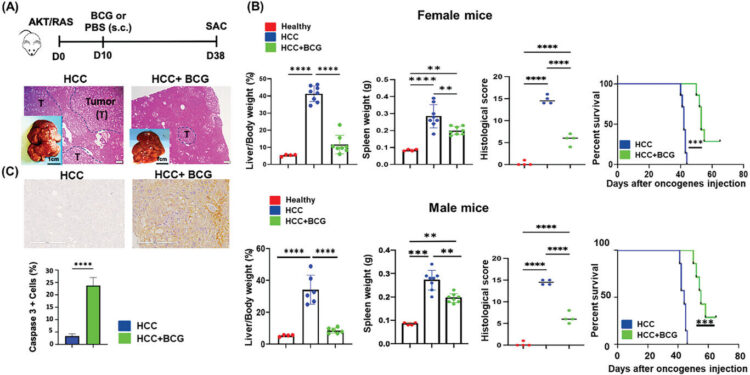BCG treats HCC and prolongs the survival time of HCC mice. A) The schematic of the experimental procedure for BCG treatment. The myr-AKT1 and NRasV12 (AKT and RAS) plasmids were transfected into the livers on day 0 (D0) by hydrodynamic injection. BCG (or PBS) was injected subcutaneously on day 10 (D10). B) L/B ratios, spleen weight of female mice; hepatic histological scores and survival curves of female HCC mice treated with and without BCG. Male data is presented in a panel below. C) Caspase 3-positive cells were counted to quantify apoptosis. Credit: Advanced science (2024). DOI: 10.1002/advs.202308242
A UC Davis Health study found that a single dose of Bacillus Calmette-Guérin (BCG), the tuberculosis (TB) vaccine, reduced the burden of liver tumors and prolonged survival in mice with cancer liver. The study, published in Advanced scienceis the first to show the promising effects of the vaccine in the treatment of liver cancer.
Hepatocellular carcinoma (HCC) is the most common type of liver cancer. It is also the third leading cause of cancer-related deaths worldwide. Current therapies include surgery, radiotherapy, chemotherapy, immunotherapy and liver transplantation. However, therapeutic outcomes for liver cancer remain poor.
BCG, the century-old tuberculosis vaccine, is derived from the live bacteria Mycobacterium bovis. It is considered safe and widely used around the world.
BCG is also known to strengthen the body’s immunity. The United States Food and Drug Administration has approved it for the treatment of bladder cancer. However, the potential effect of BCG in the treatment of solid tumors, such as those of liver cancer, remained unknown.
The new study, led by Yu-Jui Distinguished Professor Yvonne Wan, showed that a dose of BCG given under the skin reduced tissue scarring (fibrosis), improved liver function, lowered liver lipids and shrank tumor.
“HCC is very difficult to treat. This cancer is considered a cold tumor, which does not respond well to immunotherapy,” said Wan, senior author of the study and vice chair of research in the Department of Pathology. and Laboratory Medicine from UC Davis. “We had good reason to believe that the BCG vaccine could stimulate an immune response. So we gave a dose of BCG to mice with liver cancer and, to our surprise, this was enough to activate the system immune system of the body and reduce the tumor burden.
How does the tuberculosis vaccine fight liver cancer?
The researchers administered a dose of BCG under the skin to mice with liver cancer. This is the same way the BCG vaccine is administered to humans. They found that BCG reduced inflammation and promoted the work of immune T cells. It notably allowed the infiltration of CD4+ and CD8+ T cells and M1 macrophages in the tumor.
“We found that BCG treatment caused the movement of T cells and macrophages towards the tumor. It also activated the body’s immunity and enhanced IFN-γ signaling, which contributes to an anti-HCC effect,” Wan said.
Macrophages are white blood cells capable of fighting cancer. BCG induced IFN-γ signaling, leading to cancer cell death.
The study also tested whether the effects of BCG on liver cancer depended on gender.
“While previous studies have shown gender differences in the effects of BCG on immunity, our data showed that both male and female HCC mice responded to BCG treatment,” Wan added.
Better immunotherapy for liver cancer
Bacterial immunotherapy, such as BCG, offers an alternative to current immunotherapy based on immune checkpoint inhibitors. It has the potential to revolutionize the therapeutic approach to HCC.
“Our study showed that BCG immunotherapy for HCC is different and superior to other immunotherapies. It requires only a single injection. In animal models, BCG generated better results in the treatment of breast cancer. liver than other standard immunotherapies, such as anti-PD-1 immunotherapy. This means a potentially more simplified treatment plan,” Wan explained.
Future directions
The study results suggest that the BCG vaccine could be repurposed as a treatment for HCC. The discovery is important since BCG is already used safely around the world.
The researchers emphasize the need to explore the potential preventative capacity of BCG and determine whether multiple doses would be even more effective in fighting liver cancer. Efficacy could also be enhanced through different dosage adjustments, timings and number of doses.
“If BCG treated a resistant tumor like liver cancer, I am optimistic that it could be effective against other hard-to-treat cancers. We would need more research to take the next step. For example, we don’t know how long “This immune memory lasts, so the effectiveness of this vaccine over time remains a mystery. The mechanism may be complicated and further research is needed,” Wan explained.
The team also recommended examining the impact of BCG on the gut microbiome via the gut-liver axis.
More information:
Farzam Vaziri et al, BCG as an innovative option for the treatment of HCC: reuse and mechanistic insights, Advanced science (2024). DOI: 10.1002/advs.202308242
Quote: Tuberculosis vaccine reduces liver cancer tumors in mice (February 21, 2024) retrieved February 21, 2024 from
This document is subject to copyright. Apart from fair use for private study or research purposes, no part may be reproduced without written permission. The content is provided for information only.



